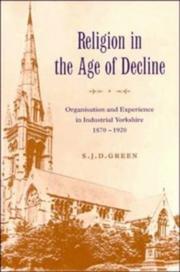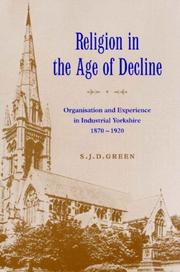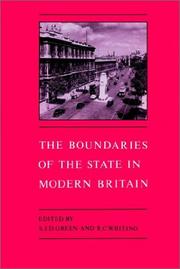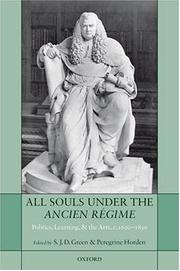| Listing 1 - 7 of 7 |
Sort by
|

ISBN: 0521561531 0521521203 0511522991 Year: 1996 Publisher: Cambridge : Cambridge University Press,
Abstract | Keywords | Export | Availability | Bookmark
 Loading...
Loading...Choose an application
- Reference Manager
- EndNote
- RefWorks (Direct export to RefWorks)
The seemingly inexorable decline of Christianity in Britain has long fascinated historians, sociologists and churchmen. They have also been exasperated by their failure to understand its origins or chart its progress. Sceptical both of traditional accounts and of their more recent rejection by revisionist writers, S. J. D. Green concentrates scholarly attention for the first time on the 'social history of the chapel' in a characteristic industrial-urban setting. He demonstrates just why so many churches were built in late Victorian Britain, who built them, who went to them, and why. He evaluates the 'associational ideal' during its period of greatest success, and explains the causes of its decline. In this way, Religion in the Age of Decline offers a fresh interpretation of the extent and the implications of the decline of religion in twentieth-century Britain.
Christianity --- Christianisme --- Yorkshire (England) --- Yorkshire (Angleterre) --- History --- Religious history --- Histoire --- Histoire religieuse --- #SBIB:94H4 --- #SBIB:HIVA --- Geschiedenis van Groot-Brittannië en Ierland --- West Riding of Yorkshire (England) --- -West Riding of Yorkshire (England) --- -Religion --- Church history --- -#SBIB:94H4 --- -Christianity --- West Riding of Yorkshire --- West Riding (England) --- Yorkshire, West Riding (England) --- Religion. --- Religious history. --- Arts and Humanities
Book
ISBN: 9780511780332 9780521839778 9781107407657 9780511933455 0511933452 9780511928222 051192822X 0511780338 0521839777 0511853270 1107218233 128291880X 9786612918803 051193209X 0511925719 0511930755 1107407656 Year: 2011 Publisher: Cambridge New York Cambridge University Press
Abstract | Keywords | Export | Availability | Bookmark
 Loading...
Loading...Choose an application
- Reference Manager
- EndNote
- RefWorks (Direct export to RefWorks)
In this 2010 book S. J. D. Green offers an important account of the causes, courses and consequences of the secularisation of English society. He argues that the critical cultural transformation of modern English society was forged in the agonised abandonment of a long-domesticated Protestant, Christian tradition between 1920 and 1960. Its effects were felt across the nation and among all classes. Yet their significance in the evolution of contemporary indigenous identities remains curiously neglected in most mainstream accounts of post-Victorian Britain. Dr Green traces the decline of English ecclesiastical institutions after 1918. He also investigates the eclipse of once-common moral sensibilities during the years up to 1945. Finally, he examines why subsequent efforts to reverse these trends so comprehensively failed. His work will be of enduring interest to modern historians, sociologists of religion, and all those concerned with the future of faith in Britain and beyond.
Protestantism --- Religious institutions --- Secularism --- Secularization (Theology) --- Secular theology --- Death of God theology --- Theology, Doctrinal --- Ethics --- Irreligion --- Utilitarianism --- Atheism --- Postsecularism --- Ecclesiastical institutions --- Faith-based institutions --- Faith-based organizations --- FBOs (Faith-based organizations) --- Institutions, Ecclesiastical --- Institutions, Religious --- Religious and ecclesiastical institutions --- Religious organizations --- Associations, institutions, etc. --- Religious facilities --- Christianity --- Church history --- Protestant churches --- Reformation --- History --- Great Britain --- Religious life and customs --- Arts and Humanities --- history of religion --- England --- secularisation --- social change
Digital
ISBN: 9780511780332 Year: 2011 Publisher: Cambridge Cambridge University Press
Abstract | Keywords | Export | Availability | Bookmark
 Loading...
Loading...Choose an application
- Reference Manager
- EndNote
- RefWorks (Direct export to RefWorks)

ISBN: 9780511522994 9780521561532 9780521521208 Year: 1996 Publisher: Cambridge Cambridge University Press
Abstract | Keywords | Export | Availability | Bookmark
 Loading...
Loading...Choose an application
- Reference Manager
- EndNote
- RefWorks (Direct export to RefWorks)

ISBN: 0521455375 0521522226 0511660359 Year: 1996 Publisher: Cambridge : Cambridge University Press,
Abstract | Keywords | Export | Availability | Bookmark
 Loading...
Loading...Choose an application
- Reference Manager
- EndNote
- RefWorks (Direct export to RefWorks)
This innovative book provides an essential historical perspective on the boundaries of the state in modern Britain. The collection of inter-disciplinary studies gathered here is unimpressed by the apparent 'rise' of the state before 1979 and its supposed 'decline' in the wake of Thatcherism. The Boundaries of the State in Modern Britain constitutes a comprehensive and coherent attempt to delineate the many and varying aspects of public involvement in private life during the twentieth century. It shows how the state has advanced into some areas of life, whilst vacating others. It explores the impact of these changes on civil society and intellectual life in Britain. Finally, the contributors consider where the state might be going in the twenty-first century.
Government spending policy --- -Political science --- -#SBIB:94H4 --- #SBIB:328H214 --- #SBIB:321H30 --- Administration --- Civil government --- Commonwealth, The --- Government --- Political theory --- Political thought --- Politics --- Science, Political --- Social sciences --- State, The --- Expenditures, Public --- Public spending policy --- Spending policy, Government --- Economic policy --- Finance, Public --- Full employment policies --- Unfunded mandates --- History --- -History --- -Geschiedenis van Groot-Brittannië en Ierland --- Instellingen en beleid: Verenigd Koninkrijk --- Hedendaagse politieke en sociale theorieën (vanaf de 19de eeuw): algemeen (incl. utilitarisme, burgerschap) --- Government policy --- Great Britain --- Economic policy. --- Politics and government --- -Social policy. --- Political science --- #SBIB:94H4 --- Geschiedenis van Groot-Brittannië en Ierland --- Social policy. --- Arts and Humanities --- ECONOMIC POLICY --- STATE INTERVENTION --- GREAT BRITAIN --- POLITICAL SCIENCE

ISBN: 9780199276356 Year: 2007 Publisher: Oxford Oxford university press
Abstract | Keywords | Export | Availability | Bookmark
 Loading...
Loading...Choose an application
- Reference Manager
- EndNote
- RefWorks (Direct export to RefWorks)
Universities and colleges --- History --- All Souls College (University of Oxford) --- History.

ISBN: 9780511660351 9780521455374 9780521522229 Year: 1996 Publisher: Cambridge Cambridge University Press
Abstract | Keywords | Export | Availability | Bookmark
 Loading...
Loading...Choose an application
- Reference Manager
- EndNote
- RefWorks (Direct export to RefWorks)
| Listing 1 - 7 of 7 |
Sort by
|

 Search
Search Feedback
Feedback About UniCat
About UniCat  Help
Help News
News